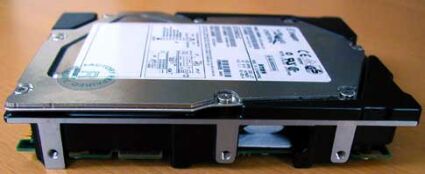We Have a Winner - Seagate's 'Cheetah X15'
Data Transfer: Not Faster Than 10k Drives?
The maximum transfer rate of the Cheetah turns out to be less than that of the latest 10,000 rpm drives from Fujitsu and Quantum, a result that will probably disappoint many of you. Is it really possible that the most technically sophisticated hard drive could perform below the current 10,000 rpm top models? The answer is 'yes', and the reason, as explained in the previous section, is that hard drive engineers sometimes have to sacrifice a bit of data density in order to reach high rotation speeds - that's exactly the case with Seagate's high-speed drive. Is this necessarily a bad thing? Not if the drive runs at 15,000 rpm.
As you know, the outer areas of the platters move much faster than the inner ones, resulting in better transfer performance for these areas. By increasing the rotation speed, the performance naturally improves for the inner areas as well. So even though the Cheetah X15 has a low data density, the high rotation speed helps to keep the minimum transfer rates for these inner areas at a very high level. More on that later.
Noise Level: No Louder Than 10k Drives?
The noise measurements provide the next surprise - although the drive rotates at a much higher speed than drives we tested before, it produces even less noise than the others! Not only is there no high-frequency noise (unlike many of the older 7,200 and 10,000 rpm drives), but even the access noise is insignificant. However, the frequency of the access noise will make it seem louder to many people than the Fujitsu and the Quantum drives.
I was also quite pleased to see that this 15,000 rpm drive caused no vibration whatsoever. If you run it next to a Seagate Barracuda ATA (a first generation 7,200 rpm drive that was formerly our reference drive and caused heavy vibrations), you will find it hard to believe that it is running at such a high rotation speed.
Get Tom's Hardware's best news and in-depth reviews, straight to your inbox.
Current page: Data Transfer: Not Faster Than 10k Drives?
Prev Page Get Ready For Seagate's High-performance Drive Next Page Access Time: Definitely Faster Than 10k Drives!
Patrick Schmid was the editor-in-chief for Tom's Hardware from 2005 to 2006. He wrote numerous articles on a wide range of hardware topics, including storage, CPUs, and system builds.
